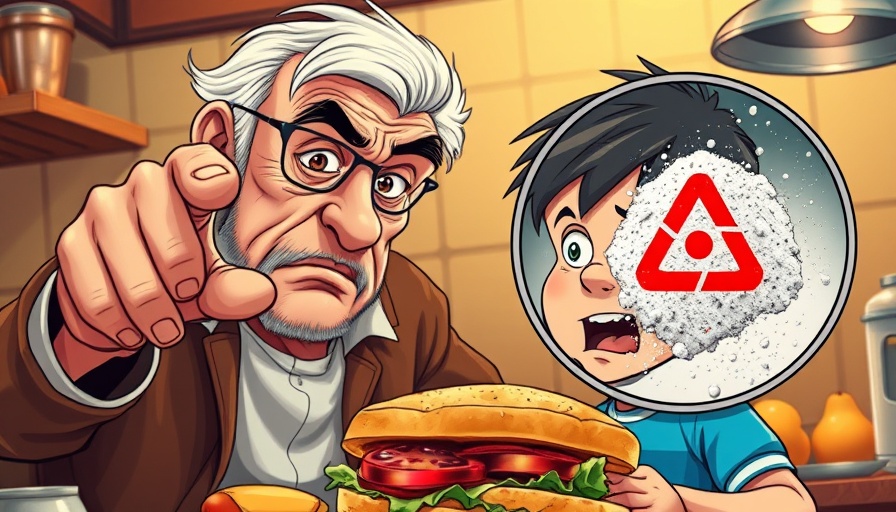
Understanding Food Bans: RFK Jr.'s Bold Move Against Toxic Ingredients
In recent discussions surrounding health and nutrition, Robert F. Kennedy Jr. (RFK Jr.) has emerged at the forefront advocating for significant reforms in what constitutes acceptable food in the American diet. As he works on an ambitious list to ban certain hazardous foods, the implications of these actions ripple well beyond just a menu change— especially for the aging population over 60 in places like Louisiana, who are often more vulnerable to the dangers of processed foods.
The video 'The 10 Dangerous Foods RFK Jr. Just BANNED' sheds light on essential health reforms, prompting deeper analysis into the implications of these bans.
What's on the Chopping Block?
RFK Jr. has pinpointed ten specific foods and additives that he aims to eliminate, citing both health risks and lack of nutritional value. The first on the list is food dyes. These artificial colorings serve no real purpose beyond aesthetics and are linked to various health issues, including cancer. Behind this decision lies the Delaney Clause, a piece of legislation intended to protect the public by prohibiting food additives that are known carcinogens.
Another significant target is the SNAP program, which helps low-income families afford food but often allows purchasing unhealthy options like sugary sodas. RFK Jr.'s proposal to cut access to these items raises critical questions about the responsibility of taxpayer-funded programs and how they can reinforce unhealthy habits.
Common Ingredients You Should Know About
Other items on RFK's list—including titanium dioxide, brominated vegetable oil, and potassium bromate—are often used in food processing but carry a disturbing history of health implications, including possible carcinogenic properties. Understanding these ingredients is vital, particularly for seniors looking to make informed choices about their diet in Louisiana, where health disparities among older adults can be exacerbated by processed food consumption.
The High Cost of Low-Quality Food
Consider the case of high fructose corn syrup—a cheaper alternative to sugar but linked to liver damage, type 2 diabetes, and heart disease. For the elderly, particularly in Louisiana, the dangers are twofold: not only are these sweeteners prevalent in commonly consumed products, but they represent a systemic issue of subsidizing unhealthy food options at the taxpayer’s expense.
Why Should We Care?
The health issues tied to these ingredients signify a wider public health crisis. Unraveling the intricacies affecting adults over 60 within Louisiana presents an urgent call to action. By confronting these potentially harmful foods, RFK Jr. is advocating not just for improvements in food quality, but for a comprehensive shift towards a health-conscious society. The effects of ultraprocessed foods, which now comprise a significant part of the average diet, might be subtle initially but can lead to long-term adverse health effects. The narrative surrounding them is ever-important, as proper nutrition is foundational to mental and physical well-being.
Working Toward Healthier Alternatives
Awareness and education play pivotal roles in advocating for better food choices. With RFK's call to action, there emerges a promising opportunity for communities to engage in discussions surrounding nutrition. As Louisiana’s population over 60 seeks guidance, initiatives like the Dr. Berg Junk Food Meter app are beneficial in helping individuals scan food for harmful ingredients, thus empowering local communities to make healthier choices.
Possible Resistance and Counterarguments
While these changes are promising, it’s also essential to recognize the potential pushback from industries profiting off these product lines. Corporations and lobby groups may rally to protect their interests, leading to a challenging dynamic where public health goals clash with economic motivations. The key takeaway is that while RFK Jr. advocates for tightening regulations on food safety, understanding the arguments against these reforms can enhance an informed public discourse.
Final Thoughts: Moving Forward for Healthier Living
As Louisiana's seniors navigate the complexities of health and nutrition, RFK Jr.'s initiatives provide a beacon of hope. Advocating for safe, wholesome foods can lead to transformative changes in overall health outcomes in this demographic. Recognizing the implications of diet on health is vital, and empowering individuals with information can lay the groundwork for a healthier future.
If you resonate with the idea of protecting public health and promoting informed consumer choices, stay tuned for more insights on how you can support these initiatives. Remember, becoming aware and educated on what’s truly on your plate is the first step toward overall wellbeing.
 Add Row
Add Row  Add
Add 



Write A Comment